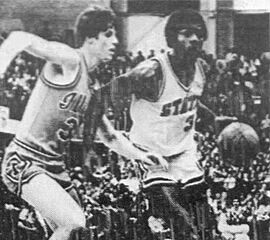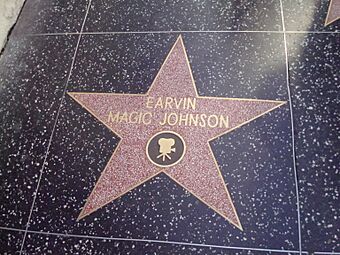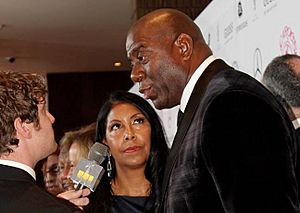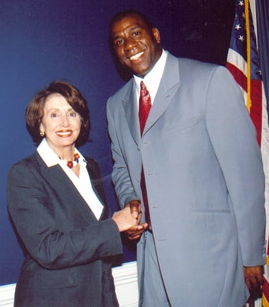Magic Johnson facts for kids
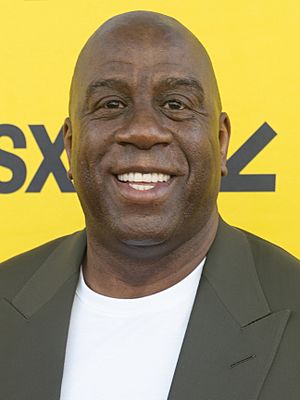
Johnson in 2022
|
||||||||||||||||||||
| Personal information | ||||||||||||||||||||
|---|---|---|---|---|---|---|---|---|---|---|---|---|---|---|---|---|---|---|---|---|
| Born | August 14, 1959 Lansing, Michigan, U.S. |
|||||||||||||||||||
| High school | Everett (Lansing, Michigan) | |||||||||||||||||||
| Listed height | 6 ft 9 in (2.06 m) | |||||||||||||||||||
| Listed weight | 220 lb (100 kg) | |||||||||||||||||||
| Career information | ||||||||||||||||||||
| College | Michigan State (1977–1979) | |||||||||||||||||||
| NBA Draft | 1979 / Round: 1 / Pick: 1st overall | |||||||||||||||||||
| Selected by the Los Angeles Lakers | ||||||||||||||||||||
| Pro career | 1979–1991, 1996, 1999–2000 | |||||||||||||||||||
| Career history | ||||||||||||||||||||
| As player: | ||||||||||||||||||||
| 1979–1991, 1996 | Los Angeles Lakers | |||||||||||||||||||
| 1999–2000 | Magic M7 Borås | |||||||||||||||||||
| 2000 | Magic Great Danes | |||||||||||||||||||
| As coach: | ||||||||||||||||||||
| 1994 | Los Angeles Lakers | |||||||||||||||||||
| Career highlights and awards | ||||||||||||||||||||
|
||||||||||||||||||||
| Career NBA statistics | ||||||||||||||||||||
| Points | 17,707 (19.5 ppg) | |||||||||||||||||||
| Rebounds | 6,559 (7.2 rpg) | |||||||||||||||||||
| Assists | 10,141 (11.2 apg) | |||||||||||||||||||
|
Medals
|
||||||||||||||||||||
Earvin "Magic" Johnson Jr. (born August 14, 1959) is an American businessman and a famous former professional basketball player. Many people consider him the greatest point guard of all time. Johnson played his entire career with the Los Angeles Lakers in the National Basketball Association (NBA).
After winning a college national championship with the Michigan State Spartans in 1979, Johnson was the first player chosen in the 1979 NBA draft by the Lakers. He then led the team to five NBA championships during their exciting "Showtime" era. Johnson retired in 1991 due to a serious health condition. He later returned to play in the 1992 NBA All-Star Game, where he won the All-Star MVP Award. He retired again but made another comeback in 1996, playing 32 games for the Lakers before retiring for the final time.
Johnson was known for his amazing court vision, passing skills, and strong leadership. He was one of the best players of his time. He won three NBA Most Valuable Player Awards, three NBA Finals MVP awards, and was chosen for the All-NBA First Team nine times. He was also selected for twelve All-Star Games. Johnson led the league in assists four times during the regular season. He holds NBA records for the highest average assists per game in both the regular season (11.19) and the playoffs (12.35). He also has the most career assists and triple-doubles in the NBA playoffs.
Johnson was a co-captain of the 1992 United States men's Olympic basketball team, famously known as "The Dream Team." This team won the Olympic gold medal in Barcelona. Johnson is one of only eight players to achieve the basketball Triple Crown, meaning he won an NCAA championship, an NBA championship, and an Olympic gold medal. After leaving the NBA in 1991, he created the Magic Johnson All-Stars, a traveling team that played exhibition games around the world.
In 1996, Johnson was honored as one of the 50 Greatest Players in NBA History. In 2021, he was selected for the NBA 75th Anniversary Team. He was inducted into the Naismith Memorial Basketball Hall of Fame twice: once in 2002 for his individual career and again in 2010 as a member of the Dream Team. His friendly rivalry with Boston Celtics star Larry Bird is very famous. They played against each other in the 1979 NCAA finals and three NBA championship series.
Since his retirement, Johnson has become a successful businessman, a philanthropist (someone who helps others), a broadcaster, and a motivational speaker. He has also been an advocate for important health awareness. Johnson was a part-owner of the Lakers and served as the team's president of basketball operations in the late 2010s. He is a founding member of Guggenheim Baseball Management, which manages the Los Angeles Dodgers (MLB). He is also part of the ownership groups for the Los Angeles Sparks (WNBA), Los Angeles FC (MLS), the Washington Commanders (NFL), and the Washington Spirit (NWSL). Johnson has won 16 championships in his career: one in college, five as an NBA player, and ten as an owner. In 2025, Johnson received the Presidential Medal of Freedom, the highest award a civilian can get in the United States. As of May 2025, his wealth was estimated at US$1.5 billion by Forbes.
Contents
- Early Life and Basketball Dreams
- High School Basketball Success
- College Basketball Journey
- Amazing NBA Career
- Health Announcement and Olympic Gold
- Life After Playing Basketball
- The Famous Rivalry with Larry Bird
- Magic Johnson's Legacy
- NBA Career Statistics
- Head Coaching Record
- Awards and Honors
- Executive Roles and Team Ownership
- Personal Life and Business Ventures
- See also
Early Life and Basketball Dreams
Earvin Johnson Jr. was born in Lansing, Michigan. His father, Earvin Sr., worked at General Motors, and his mother, Christine, was a school janitor. Johnson had many siblings and learned the value of hard work from his parents. His mother spent hours cleaning their home and preparing meals, while his father worked hard at several jobs. Johnson often helped his father collect garbage, and some neighborhood kids playfully called him "Garbage Man." His mother raised him in the Seventh-day Adventist Church.
Johnson loved basketball from a young age. His favorite player was Bill Russell, who he admired for winning many championships. He also looked up to players like Earl Monroe and Marques Haynes, and practiced basketball "all day." Johnson came from an athletic family. His father played high school basketball, and his mother also played as a child.
By the time he was in eighth grade, Johnson started dreaming of a future in basketball. He was a very strong junior high player, once scoring 48 points in a single game. He hoped to play at Sexton High School, which had a great basketball team and was close to his home. However, his plans changed when he learned he would be bused to Everett High School. Everett was mostly white, while Sexton was mostly black. Johnson's older siblings had faced challenges when they were bused to Everett the year before.
Johnson joined the basketball team at Everett, but at first, his new teammates didn't pass him the ball during practice. He almost got into a fight before his coach stepped in. Eventually, Johnson adjusted to the situation, and the small group of black students looked to him as their leader. Looking back, Johnson realized that going to Everett helped him grow. He said it "got me out of my own little world and taught me how to understand white people, how to communicate and deal with them."
High School Basketball Success
Johnson earned the nickname "Magic" when he was 15 years old. He achieved a triple-double (scoring double digits in three different stats) with 36 points, 18 rebounds, and 16 assists during a game in his sophomore year at Everett. A sports writer for the Lansing State Journal, Fred Stabley Jr., gave him the name.
In his final high school season, Johnson led Everett to an impressive 27–1 record. He averaged 28.8 points and 16.8 rebounds per game. He also led his team to an overtime victory in the state championship game. Johnson dedicated this championship win to his best friend, Reggie Chastine, who had passed away in a car accident the previous summer. Johnson said Chastine helped him become a better player and person. Johnson finished his high school career with two All-State selections and was considered one of Michigan's best high school players ever. He was also chosen for the first-ever McDonald's All-American team in 1977.
College Basketball Journey
Many top colleges wanted Johnson to play for them, including Indiana and UCLA. However, he chose to stay close to home. He decided to attend Michigan State in East Lansing because coach Jud Heathcote promised he could play as a point guard. The talented players already on Michigan State's team also attracted him.
Johnson didn't initially plan to play basketball professionally. He focused on his communication studies major and hoped to become a television commentator. In his freshman year, playing with future NBA players like Greg Kelser, Johnson averaged 17.0 points, 7.9 rebounds, and 7.4 assists per game. He led the Spartans to a 25–5 record, a Big Ten Conference title, and a spot in the 1978 NCAA tournament. The Spartans reached the Elite Eight but lost to Kentucky.
During the 1978–79 season, Michigan State again made it to the NCAA tournament. They reached the championship game and played against Indiana State, led by star player Larry Bird. This game was the most-watched college basketball game ever. Michigan State won 75–64, and Johnson was named the Most Outstanding Player of the Final Four. He was also selected for the 1978–79 All-American team. After two successful years in college, Johnson decided to enter the 1979 NBA draft.
Amazing NBA Career
Johnson was the very first player chosen in the 1979 NBA draft by the Los Angeles Lakers. He was thrilled to play alongside Kareem Abdul-Jabbar, the Lakers' tall center and a legendary scorer. Kareem hadn't won a championship with the Lakers yet, and Johnson was expected to help them achieve that goal. Johnson wore jersey number 32 because Kareem already had number 33. Even though some thought Johnson, who was 6 feet 9 inches tall, should play forward, Lakers coach Jack McKinney made him the point guard.
Johnson had an incredible rookie season, averaging 18.0 points, 7.7 rebounds, and 7.3 assists per game. He was named to the NBA All-Rookie Team and became an NBA All-Star Game starter. The Lakers finished the regular season with a 60–22 record and reached the 1980 NBA Finals. They faced the Philadelphia 76ers, led by Julius Erving. The Lakers led the series 3–2, but Abdul-Jabbar injured his ankle and couldn't play in Game 6. Coach Paul Westhead decided to start Johnson at center for that game. Johnson delivered an amazing performance, scoring 42 points, grabbing 15 rebounds, and dishing out 7 assists in a 123–107 win. He played guard, forward, and center throughout the game. Johnson became the only rookie ever to win the NBA Finals MVP award.
Early Challenges and More Championships
At the start of the 1980–81 season, Johnson was sidelined with a knee injury, missing 45 games. He later said this was a very tough time for him. He returned for the 1981 playoffs, but the Lakers were upset by the Houston Rockets.
In 1981, Johnson signed a huge 25-year, $25 million contract with the Lakers, which was the biggest in sports at the time. During the 1981–82 season, Johnson had disagreements with coach Westhead, feeling the team's offense was too slow. After Johnson expressed his concerns, Lakers owner Jerry Buss replaced Westhead with Pat Riley. Johnson averaged 18.6 points, 9.6 rebounds, 9.5 assists, and a league-high 2.7 steals per game that season. He was also named to the All-NBA Second Team. The Lakers went on to win the 1982 NBA Finals against Philadelphia, and Johnson earned his second NBA Finals MVP award.
In the 1982–83 NBA season, Johnson continued to excel, averaging 16.8 points, 10.5 assists, and 8.6 rebounds per game. He received his first All-NBA First Team nomination. The Lakers reached the 1983 NBA Finals again, facing the Sixers with Moses Malone and Erving. With some of his teammates injured, the Lakers were swept by the Sixers.
Epic Rivalry with Larry Bird
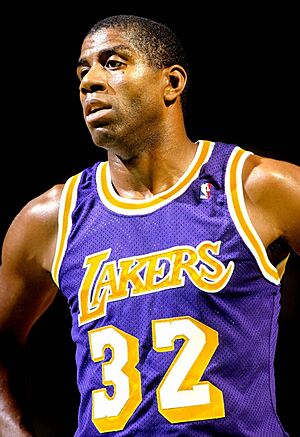
Before Johnson's fifth season, the Lakers traded Norm Nixon to give Johnson more control of the ball. Johnson had another great season, averaging 17.6 points, 13.1 assists, and 7.3 rebounds per game. The Lakers reached the 1984 NBA Finals for the third year in a row, where Johnson's Lakers and Bird's Celtics met in the playoffs for the first time. The series was very close and intense, with the Celtics winning in seven games. Johnson later called this series "the one championship we should have had but didn't get."
In the 1984–85 regular season, Johnson averaged 18.3 points, 12.6 assists, and 6.2 rebounds per game. The 1985 NBA Finals saw the Lakers and Celtics face off again. After a tough start, the Lakers, led by a strong performance from 38-year-old Abdul-Jabbar, defeated the Celtics in six games. Johnson and Abdul-Jabbar both said this Finals win was a highlight of their careers.
Johnson continued his strong play in the 1985–86 NBA season, but the Lakers lost to the Houston Rockets in the Western Conference Finals. The next season was outstanding for Johnson, as he averaged a career-high 23.9 points, along with 12.2 assists and 6.3 rebounds per game. He earned his first regular season MVP award. The 1987 NBA Finals brought another matchup with the Celtics. In Game 4, Johnson made a famous last-second hook shot to win the game. Los Angeles defeated Boston in six games, and Johnson received his third Finals MVP title.
More Championships and Final Seasons
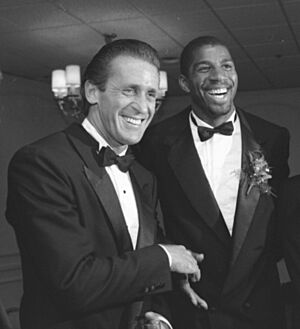
Before the 1987–88 NBA season, Lakers coach Pat Riley promised they would win the NBA title again. Johnson had another great season, averaging 19.6 points, 11.9 assists, and 6.2 rebounds per game. In the 1988 playoffs, the Lakers had to fight through two tough seven-game series to reach the Finals. They faced the Detroit Pistons, known as the "Bad Boys" for their physical style of play. The series went to a decisive Game 7, where Lakers forward James Worthy had a triple-double and led his team to victory. This was Johnson's fifth and final NBA championship.
In the 1988–89 NBA season, Johnson's excellent play earned him his second MVP award. The 1989 NBA Finals saw the Lakers face the Pistons again. However, Johnson suffered a hamstring injury in Game 2, and the Pistons swept the Lakers 4–0.
Playing without Abdul-Jabbar for the first time, Johnson won his third MVP award in the 1989–90 NBA season. However, the Lakers lost in the Western Conference semifinals, their earliest playoff exit in nine years. In the 1990–91 season, Johnson led the Lakers to the 1991 NBA Finals. There, they faced the Chicago Bulls, led by Michael Jordan. The Bulls won the series 4–1, with Jordan earning Finals MVP. This was the last championship series of Johnson's playing career.
Health Announcement and Olympic Gold
In October 1991, Johnson played with the Lakers in the McDonald's Open in Paris, France, and was named the tournament MVP. However, after a medical check-up before the 1991–92 NBA season, Johnson discovered he had a serious health condition. On November 7, 1991, Johnson publicly announced his immediate retirement from basketball. He shared that his wife, Cookie, and their unborn child were healthy, and he would dedicate his life to educating people about this health condition.
Johnson's announcement was a major news story in the United States. Many people praised Johnson as a hero, and then-U.S. president George H. W. Bush called him "a hero for anyone who loves sports."
Even after his retirement, fans voted Johnson to start in the 1992 NBA All-Star Game in Orlando. There were some discussions among players about his return, but Johnson played and led the West team to a 153–113 win. He was crowned All-Star MVP after scoring 25 points, dishing out 9 assists, and grabbing 5 rebounds. The game ended with Johnson making a last-minute three-pointer, and players from both teams congratulated him on the court.
Johnson was also chosen to play for the U.S. national team at the 1992 Summer Olympics in Barcelona. This team, known as the "Dream Team," included other NBA legends like Bird, Jordan, and Charles Barkley. The Dream Team was considered unbeatable and dominated the Olympic competition, winning the gold medal with an 8–0 record. Johnson played less due to knee problems, but he received standing ovations from the crowd and used the opportunity to inspire many people facing health challenges.
Life After Playing Basketball
After the Olympics, Johnson considered returning to the NBA but decided against it before the season began. Later, Johnson reflected that he wished he hadn't retired so soon, feeling he could have continued playing.
During his retirement, Johnson wrote a book about health, ran several businesses, worked as a commentator for NBC, and toured with a basketball team of former college and NBA players across Asia, Australia, and New Zealand. In 1985, Johnson started "A Midsummer Night's Magic," a yearly charity event that included a celebrity basketball game and a fancy dinner. The money raised went to the United Negro College Fund. This event continued for twenty years and eventually became part of the Magic Johnson Foundation, which he founded in 1991.
Coaching and Playing Again
Johnson returned to the NBA as a coach for the Lakers near the end of the 1993–94 NBA season. He took the job at the request of owner Jerry Buss. Johnson coached a team that included some of his former teammates. The Lakers started well under Johnson, winning five of their first six games. However, after losing the next five, Johnson decided to resign as coach after the season, saying coaching was not his dream. His final record as a head coach was 5–11. In June 1994, he chose to buy a 5% share of the team instead.
At 36 years old, Johnson made another comeback as a player for the Lakers during the 1995–96 NBA season. He had been working out intensely to stay healthy. He officially returned on January 29, 1996, and played his first game the next day. Coming off the bench, Johnson scored 19 points, grabbed 8 rebounds, and had 10 assists in a Lakers victory. He recorded the final triple-double of his career on February 14. Playing as a power forward, he averaged 14.6 points, 6.9 assists, and 5.7 rebounds per game in 32 games. The Lakers had a 22–10 record in the games Johnson played, and he considered his final comeback a success. The Lakers made the playoffs but lost to the Houston Rockets in the first round.
After the playoffs, Johnson decided to retire permanently. He said, "I am going out on my terms, something I couldn't say when I aborted a comeback in 1992."
Magic Johnson All-Stars and International Play
Even though he was no longer in the NBA, Johnson still wanted to play competitive basketball. He formed the Magic Johnson All-Stars, a traveling team made up of former NBA and college players. In 1994, Johnson and his team played games in Australia, Israel, South America, Europe, New Zealand, and Japan. They also played against teams from the CBA in the United States. By the time he returned to the Lakers in 1996, the Magic Johnson All-Stars had an undefeated record of 55–0. Johnson continued to play with the team for several years. In November 2001, at 42 years old, Johnson played against his college team, Michigan State, in his hometown of Lansing. He had a triple-double, but his All-Star team lost by two points.
In 1999, Johnson joined the Swedish basketball team M7 Borås (now Borås Basket) and was undefeated in five games. He also became a co-owner of the club. Later, he played for the Danish team The Great Danes.
The Famous Rivalry with Larry Bird
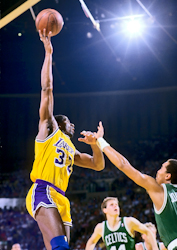
The rivalry between Johnson and Larry Bird began when Johnson's Michigan State Spartans beat Bird's Indiana State Sycamores in the 1979 NCAA finals. This rivalry continued in the NBA, reaching its peak when the Boston Celtics and Los Angeles Lakers met in three NBA Finals between 1984 and 1987. The Lakers won two of those three championships. Johnson once said that for him, the 82-game regular season had 80 normal games and two Lakers–Celtics games. Bird also admitted that Johnson's daily game statistics were the first thing he checked each morning.
Many journalists believed the Johnson–Bird rivalry was so exciting because it showed many different contrasts. It was the clash between the Lakers and Celtics, between the flashy "Showtime" style of Hollywood and the hardworking "Celtic Pride" of Boston. The rivalry was also very important because it brought national attention to the NBA, which had been struggling with declining interest and low TV ratings. With these two future Hall of Famers, the league gained many new fans. According to sports journalist Larry Schwartz, Johnson and Bird helped save the NBA.
Despite their intense on-court rivalry, Johnson and Bird became good friends. This friendship grew during the filming of a 1984 Converse shoe commercial where they pretended to be enemies. Johnson attended Bird's retirement ceremony in 1992 and called Bird a "friend forever." Bird also formally inducted Johnson into the Hall of Fame.
In 2009, Johnson and Bird worked with journalist Jackie MacMullan on a book called When the Game Was Ours, which talked about their rivalry and friendship. In 2010, HBO made a documentary about their rivalry called Magic & Bird: A Courtship of Rivals.
Magic Johnson's Legacy
In 905 NBA games, Johnson scored 17,707 points, grabbed 6,559 rebounds, and made 10,141 assists. This means he averaged 19.5 points, 7.2 rebounds, and 11.2 assists per game. His 11.2 assists per game average is the highest in NBA history. Johnson shares the record for most assists in a single playoff game (24) and holds the Finals record for assists in a game (21). He also has the most playoff assists ever (2,346). He is the only player to average 12 assists in an NBA Finals series, doing it six times. He holds the All-Star Game record for assists in a single game (22) and for career assists (127). Johnson is one of only eight basketball players to achieve the Triple Crown (NCAA championship, NBA championship, and Olympic gold medal).
"Magic is head-and-shoulders above everybody else [...] I've never seen [anybody] as good as him."
Johnson created a fast-paced style of basketball called "Showtime." This style featured exciting "no-look passes off the fast break, perfect alley-oops from halfcourt, spinning feeds, and powerful passes under the basket through multiple defenders." Fellow Lakers guard Michael Cooper once said, "There have been times when [Johnson] has thrown passes and I wasn't sure where he was going. Then one of our guys catches the ball and scores, and I run back up the floor convinced that he must've thrown it through somebody." Johnson could control a game without scoring much, by running the offense and distributing the ball with flair. In the 1982 NBA Finals, he was named Finals MVP with only 16.2 points per game, the lowest average for any Finals MVP in the era of the three-point shot.
Johnson was unique because he played point guard despite being 6 feet 9 inches tall, a height usually for bigger players closer to the basket. His career total of 138 triple-double games ranks him fourth all-time. Johnson is also the only player in NBA Finals history to have triple-doubles in multiple games that clinched a series win.
For his amazing achievements, Johnson was voted one of the 50 Greatest Players in NBA History by the NBA in 1996. He was also selected for the NBA 75th Anniversary Team in 2021. The Naismith Memorial Basketball Hall of Fame inducted him in 2002. In 2006, ESPN.com called Johnson the greatest point guard of all time. In 2022, The Athletic ranked Johnson as the 5th greatest player in NBA history and the highest-ranked point guard. At the 2019 NBA Awards, Johnson received the NBA Lifetime Achievement Award (shared with Bird). In 2022, the NBA started awarding MVPs for the conference finals; the Western Conference Finals MVP trophy is named after Johnson.
NBA Career Statistics
| Legend | |||||
|---|---|---|---|---|---|
| GP | Games played | GS | Games started | MPG | Minutes per game |
| FG% | Field goal percentage | 3P% | 3-point field goal percentage | FT% | Free throw percentage |
| RPG | Rebounds per game | APG | Assists per game | SPG | Steals per game |
| BPG | Blocks per game | PPG | Points per game | Bold | Career high |
Regular season
| Year | Team | GP | GS | MPG | FG% | 3P% | FT% | RPG | APG | SPG | BPG | PPG |
|---|---|---|---|---|---|---|---|---|---|---|---|---|
| 1979–80 |
L.A. Lakers | 77 | 72 | 36.3 | .530 | .226 | .810 | 7.7 | 7.3 | 2.4 | 0.5 | 18.0 |
| 1980–81 | L.A. Lakers | 37 | 35 | 37.1 | .532 | .176 | .760 | 8.6 | 8.6 | 3.4* | 0.7 | 21.6 |
| 1981–82 |
L.A. Lakers | 78 | 77 | 38.3 | .537 | .207 | .760 | 9.6 | 9.5 | 2.7* | 0.4 | 18.6 |
| 1982–83 | L.A. Lakers | 79 | 79 | 36.8 | .548 | .000 | .800 | 8.6 | 10.5* | 2.2 | 0.6 | 16.8 |
| 1983–84 | L.A. Lakers | 67 | 66 | 38.3 | .565 | .207 | .810 | 7.3 | 13.1* | 2.2 | 0.7 | 17.6 |
| 1984–85 |
L.A. Lakers | 77 | 77 | 36.1 | .561 | .189 | .843 | 6.2 | 12.6 | 1.5 | 0.3 | 18.3 |
| 1985–86 | L.A. Lakers | 72 | 70 | 35.8 | .526 | .233 | .871 | 5.9 | 12.6* | 1.6 | 0.2 | 18.8 |
| 1986–87 |
L.A. Lakers | 80 | 80 | 36.3 | .522 | .205 | .848 | 6.3 | 12.2* | 1.7 | 0.4 | 23.9 |
| 1987–88 |
L.A. Lakers | 72 | 70 | 36.6 | .492 | .196 | .853 | 6.2 | 11.9 | 1.6 | 0.2 | 19.6 |
| 1988–89 | L.A. Lakers | 77 | 77 | 37.5 | .509 | .314 | .911* | 7.9 | 12.8 | 1.8 | 0.3 | 22.5 |
| 1989–90 | L.A. Lakers | 79 | 79 | 37.2 | .480 | .384 | .890 | 6.6 | 11.5 | 1.7 | 0.4 | 22.3 |
| 1990–91 | L.A. Lakers | 79 | 79 | 37.1 | .477 | .320 | .906 | 7.0 | 12.5 | 1.3 | 0.2 | 19.4 |
| 1995–96 | L.A. Lakers | 32 | 9 | 29.9 | .466 | .379 | .856 | 5.7 | 6.9 | 0.8 | 0.4 | 14.6 |
| Career | 906 | 870 | 36.7 | .520 | .303 | .848 | 7.2 | 11.2 |
1.9 | 0.4 | 19.5 | |
| All-Star | 11 | 10 | 30.1 | .489 | .476 | .905 | 5.2 | 11.5 | 1.9 | 0.6 | 16.0 | |
Playoffs
| Year | Team | GP | GS | MPG | FG% | 3P% | FT% | RPG | APG | SPG | BPG | PPG |
|---|---|---|---|---|---|---|---|---|---|---|---|---|
| 1980 |
L.A. Lakers | 16 | 16 | 41.1 | .518 | .250 | .802 | 10.5 | 9.4 | 3.1 | 0.4 | 18.3 |
| 1981 | L.A. Lakers | 3 | 3 | 42.3 | .388 | .000 | .650 | 13.7 | 7.0 | 2.7 | 1.0 | 17.0 |
| 1982 |
L.A. Lakers | 14 | 14 | 40.1 | .529 | .000 | .828 | 11.3 | 9.3 | 2.9 | 0.2 | 17.4 |
| 1983 | L.A. Lakers | 15 | 15 | 42.9 | .485 | .000 | .840 | 8.5 | 12.8 | 2.3 | 0.8 | 17.9 |
| 1984 | L.A. Lakers | 21 | 21 | 39.9 | .551 | .000 | .800 | 6.6 | 13.5 | 2.0 | 1.0 | 18.2 |
| 1985 |
L.A. Lakers | 19 | 19 | 36.2 | .513 | .143 | .847 | 7.1 | 15.2 | 1.7 | 0.2 | 17.5 |
| 1986 | L.A. Lakers | 14 | 14 | 38.6 | .537 | .000 | .766 | 7.1 | 15.1 | 1.9 | 0.1 | 21.6 |
| 1987 |
L.A. Lakers | 18 | 18 | 37.0 | .539 | .200 | .831 | 7.7 | 12.2 | 1.7 | 0.4 | 21.8 |
| 1988 |
L.A. Lakers | 24 | 24 | 40.2 | .514 | .500 | .852 | 5.4 | 12.6 | 1.4 | 0.2 | 19.9 |
| 1989 | L.A. Lakers | 14 | 14 | 37.0 | .489 | .286 | .907 | 5.9 | 11.8 | 1.9 | 0.2 | 18.4 |
| 1990 | L.A. Lakers | 9 | 9 | 41.8 | .490 | .200 | .886 | 6.3 | 12.8 | 1.2 | 0.1 | 25.2 |
| 1991 | L.A. Lakers | 19 | 19 | 43.3 | .440 | .296 | .882 | 8.1 | 12.6 | 1.2 | 0.0 | 21.8 |
| 1996 | L.A. Lakers | 4 | 0 | 33.8 | .385 | .333 | .848 | 8.5 | 6.5 | 0.0 | 0.0 | 15.3 |
| Career | 190 | 186 | 39.7 | .506 | .241 | .838 | 7.7 | 12.3 |
1.9 | 0.3 | 19.5 | |
Head Coaching Record
| Regular season | G | Games coached | W | Games won | L | Games lost | W–L % | Win–loss % |
| Playoffs | PG | Playoff games | PW | Playoff wins | PL | Playoff losses | PW–L % | Playoff win–loss % |
| Team | Year | G | W | L | W–L% | Finish | PG | PW | PL | PW–L% | Result |
|---|---|---|---|---|---|---|---|---|---|---|---|
| L.A. Lakers | 1993–94 | 16 | 5 | 11 | .313 | (resigned) | — | — | — | — | — |
| Career | 16 | 5 | 11 | .313 | — | — | — | — | — | ||
Awards and Honors
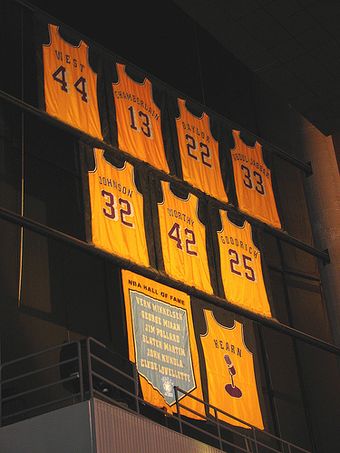
Basketball Triple Crown
NBA
- 5× NBA champion (1980, 1982, 1985, 1987, 1988)
- 3× NBA Most Valuable Player (1987, 1989, 1990)
- 3× NBA Finals MVP (1980, 1982, 1987)
- 9× All-NBA First Team (1983–1991)
- All-NBA Second Team (1982)
- 12× NBA All-Star (1980, 1982–1992)
- 2× NBA All-Star Game MVP (1990, 1992)
- McDonald's Open winner (1991)
- McDonald's Open MVP (1991)
- J. Walter Kennedy Citizenship Award (1992)
- NBA Lifetime Achievement Award (2019)
- 4× NBA assists leader (1983, 1984, 1986, 1987)
- 2× NBA steals leader (1981, 1982)
- 6× NBA Player of the Month
- 18× NBA Player of the Week
- Named one of the 50 Greatest Players in NBA History in 1996
- Selected on the NBA 75th Anniversary Team in 2021
- No. 32 retired by the Los Angeles Lakers
- Statue in front of Crypto.com Arena
- Trophy named in Johnson's honor (Earvin "Magic" Johnson Trophy) awarded to Western Conference Finals MVP (established in 2022)
USA Basketball
- Olympic gold medal winner (1992)
- Tournament of the Americas gold medal winner (1992)
NCAA
- 2× Big Ten champion (1978, 1979)
- NCAA national championship (1979)
- NCAA basketball tournament Most Outstanding Player (1979)
- Chicago Tribune Silver Basketball Award (1979)
- Consensus first-team All-American (1979)
- AP first-team All-American (1979)
- USBWA first-team All-American (1979)
- NABC first-team All-American (1979)
- UPI first-team All-American (1979)
- NABC second-team All-American (1978)
- AP third-team All-American (1978)
- UPI third-team All-American (1978)
- 2× first-team All-Big Ten (1978, 1979)
- No. 33 retired by Michigan State Spartans
- Statue at Michigan State
High school
- 1977 Michigan high school state champion (Lansing Everett High School)
- First-team Parade All-American (1977)
- McDonald's All-American (1977)
- Mr. Basketball of Michigan (1977)
Halls of Fame
- Michigan Sports Hall of Fame – Class of 1998
- Star on the Hollywood Walk of Fame – 2001
- 2× Naismith Memorial Basketball Hall of Fame inductee:
- Class of 2002 – individual
- Class of 2010 – member of "The Dream Team"
- National Collegiate Basketball Hall of Fame – Class of 2006
- FIBA Hall of Fame – Class of 2017 (as a member of "The Dream Team")
- U.S. Olympic Hall of Fame – Class of 2009 (as a member of "The Dream Team")
- California Hall of Fame – Class of 2011
Ownership
- 5× NBA champion (2000, 2001, 2002, 2009, 2010) — as part owner/executive of the Los Angeles Lakers
- WNBA champion (2016) — as part owner of the Los Angeles Sparks
- 3× World Series champion (2020, 2024, 2025) — as part owner of the Los Angeles Dodgers
- MLS Cup champion (2022) — as part owner of Los Angeles FC
Media and entertainment
- Sporting News NBA MVP (1987)
- Sporting News NBA 1980s All-Decade First-Team
- AP NBA 1980s All-Decade Team
- NAACP Image Awards – Jackie Robinson Sports Award (1992)
- Grammy Award for Best Spoken Word or Non-Musical Album (1993)
- Marca Leyenda (2002)
- Harold & Carole Pump Foundation – Lifetime Achievement Award (2009)
- Sports Illustrated's Muhammad Ali Legacy Award (2014)
- MLB Beacon of Hope Award (2015)
National
 Presidential Medal of Freedom, United States (January 4, 2025)
Presidential Medal of Freedom, United States (January 4, 2025) Ripple of Hope Award, United States, December 9, 2025
Ripple of Hope Award, United States, December 9, 2025
Executive Roles and Team Ownership
On February 21, 2017, Johnson became the president of basketball operations for the Los Angeles Lakers, replacing Jim Buss. In this role, Johnson worked to bring star players to the Lakers. The team signed free agent LeBron James to a four-year contract in 2018. However, the Lakers did not reach the playoffs during Johnson's time as an executive. On April 9, 2019, Johnson resigned from his position, saying he wanted to return to his role as an NBA ambassador.
In January 2012, Johnson joined a group to bid for ownership of the Los Angeles Dodgers baseball team. In March 2012, Johnson's group won the bid, paying $2 billion for the Dodgers. Johnson is often seen as the public face of the ownership group, while Mark Walter is the main owner. The Dodgers won the 2020, 2024, and 2025 World Series.
Johnson also invested in other sports teams. He was a partner in the Dayton Dragons, a minor league baseball team. In 2014, he was involved in buying the Los Angeles Sparks of the WNBA. The Sparks won the WNBA championship in 2016. Johnson also became a co-owner of a Major League Soccer (MLS) team, Los Angeles FC, which started playing in 2018 and won the MLS Cup in 2022.
In 2023, Johnson invested $240 million in a group that bought the Washington Commanders of the National Football League (NFL) for $6.05 billion. Johnson, a lifelong NFL fan, called this a "dream" and the greatest achievement of his business career. In September 2024, Johnson joined the ownership group of the Washington Spirit of the National Women's Soccer League (NWSL).
Personal Life and Business Ventures
Johnson had a son, Andre Johnson, in 1981 with Melissa Mitchell. Andre was raised by his mother but visited Johnson every summer and later worked for Magic Johnson Enterprises.
In 1991, Johnson married Earlitha "Cookie" Kelly in Lansing. They have a son, Earvin III ("EJ"), who is known for his role on the reality show Rich Kids of Beverly Hills. The couple adopted a daughter, Elisa, in 1995. Johnson lives in Beverly Hills and has a vacation home in Dana Point, California. Johnson is a Christian and says his faith is very important to him.
Mentorship from Jerry Buss
Johnson had a very close relationship with Lakers owner Jerry Buss, who he saw as a mentor and father figure. Johnson called Buss his "second father" and "one of [his] best friends." Buss bought the Lakers in 1979, shortly before drafting Johnson. Buss took a special interest in Johnson, introducing him to important business contacts in Los Angeles and teaching him about running the Lakers organization. He later sold Johnson a share of the team in 1994. Johnson credits Buss with giving him the business knowledge that helped him become a part-owner of the Los Angeles Dodgers.
Buss supported Johnson when he announced his health condition in 1991. He always kept Johnson involved with the Lakers, bringing him in as a part-owner and even as a coach. In 1992, Buss gave Johnson a contract that paid him $14 million a year as a way to make up for years when Johnson wasn't the highest-paid player in the league. Even though Johnson's retirement meant this contract was no longer active, Buss insisted he still be paid. This arrangement allowed Johnson to coach the team without needing an extra salary. After Johnson's coaching period, Buss sold him a 4% share in the Lakers for $10 million, and Johnson served as a team executive.
Media and Business Success
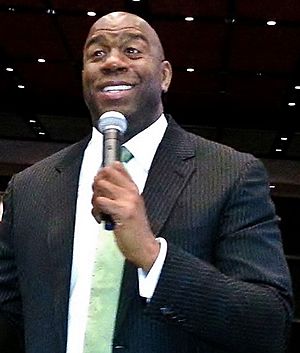
In 1997, Johnson's production company, Magic Johnson Entertainment, signed a deal with Fox. In 1998, Johnson hosted a late-night talk show called The Magic Hour, but it was canceled after two months due to low ratings. After his talk show, Johnson started a record label, Magic Johnson Music, which signed R&B artist Avant. Johnson also helped promote Janet Jackson's Velvet Rope Tour through his company Magicworks. He has worked as a motivational speaker and was an NBA commentator for Turner Network Television and later a studio analyst for ESPN.
Johnson runs Magic Johnson Enterprises, a large company with a net worth of $700 million. This company includes Magic Johnson Productions, Magic Johnson Theaters (a chain of movie theaters), and Magic Johnson Entertainment (a film studio). In 2006, Johnson created a food service company called Sodexo-Magic. In 2004, Johnson sold Magic Johnson Theaters. In 2012, Johnson launched a cable TV network called Aspire, which features programming for black audiences.
Johnson started thinking about business while still playing for the Lakers. He learned everything he could about business, often meeting with company leaders during road trips. His first business, a sporting goods store, didn't succeed, which taught him to listen to his customers. Johnson has become a leader in investing in urban communities, creating new opportunities in areas that need them. He partnered with Starbucks CEO Howard Schultz to open coffee shops in urban areas. Johnson bought 125 Starbucks stores, which had higher sales than average. This partnership, called Urban Coffee Opportunities, brought Starbucks to places like Detroit, Washington, D.C., Harlem, and Los Angeles. Johnson sold his share in these stores in 2010. He has also invested in urban real estate. According to Forbes, Johnson became a billionaire in 2023.
In 1990, Johnson and Earl Graves Sr. bought a large share in the Washington, D.C. PepsiCo bottling operation, making it the largest minority-owned facility for the company in the U.S. Johnson became a minority owner of the Lakers in 1994. He sold his ownership in the Lakers in October 2010 but continued as an unpaid vice president. In February 2017, Johnson returned to the Lakers as an advisor. In 2015, Johnson acquired a majority ownership in EquiTrust Life Insurance Company. He is also an investor for aXiomatic eSports, which owns Team Liquid.
On October 8, 2025, the Pasadena Tournament of Roses Association named Johnson the Grand Marshal of the 2026 Rose Parade. He will lead the parade and take part in the pre-game ceremony at the 2026 Rose Bowl.
Public Service and Health Advocacy
Johnson is a supporter of the Democratic Party. He has publicly supported various politicians in California and for president, including Hillary Clinton and Barack Obama.
Johnson was one of the first sports stars to publicly share his health condition. AIDS activist Elizabeth Glaser encouraged him to do so. Johnson recalled that she made him promise to "become the face of the disease and really go out and help people and educate people about it."
After his announcement in November 1991, Johnson created the Magic Johnson Foundation to help with health education and other charitable goals. In 1992, he joined the National Commission on AIDS, a committee appointed by members of Congress. Johnson later left, saying the White House had "utterly ignored" the panel's work. He was also the main speaker for the United Nations (UN) World AIDS Day Conference in 1999 and has served as a United Nations Messenger of Peace.
Johnson's campaigns aimed to show that health risks were not limited to certain groups. He wanted to "help educate all people about what [the condition] is about" and teach others not to "discriminate against people who have [the condition]."
Many studies have looked at the "Magic Johnson effect," which describes how Johnson's health announcement changed public understanding of health risks. According to one paper, his announcement was a "public-health catalyst," quickly correcting what people thought about who was at risk. It suggested that for some people, Johnson's announcement "prolonged patients' lifespans as a result of earlier access to medical care." Another paper found that his announcement was linked to "increased concern about [the condition] and with attitude and behavior changes that would lead to reduced risk."
To manage his health condition, Johnson takes a daily combination of medications that help control the virus. He has worked with pharmaceutical companies to raise awareness about health challenges in African American communities.
See also
 In Spanish: Magic Johnson para niños
In Spanish: Magic Johnson para niños
- List of athletes who came out of retirement
- List of NBA career assists leaders
- List of NBA career steals leaders
- List of NBA career turnovers leaders
- List of NBA career free throw scoring leaders
- List of NBA career triple-double leaders
- List of NBA career playoff scoring leaders
- List of NBA career playoff rebounding leaders
- List of NBA career playoff assists leaders
- List of NBA career playoff steals leaders
- List of NBA career playoff turnovers leaders
- List of NBA career playoff free throw scoring leaders
- List of NBA career playoff games played leaders
- List of NBA single-game assists leaders
- List of NBA single-game steals leaders
- List of NBA single-season assists per game leaders
- List of NBA single-season steals per game leaders
- Magic Johnson's Fast Break, a 1988 video game
 | Isaac Myers |
 | D. Hamilton Jackson |
 | A. Philip Randolph |


